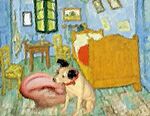Arrant-gard
The arrant-gard artistic movement of the late-to-moribund Hipster Era was an attempt to answer the defects of abstractionist and post-modernist art. It not so much challenged prevailing thought as avoided statements in favor of limericks. In effect, it held up a mirror to both reality and art, but held the mirror backwards so that the observer could only see the chipped grey paint and dust on the back.
If post-modern art adopted a stance of ironic detatchment, then arrant-gard art stood as the statement of those who noticed that post-modern detatchment was actually a manifesto of deep involvement which only pretended to be detached. Arrant-gard art therefore only pretended to parody the surface irony -- the pretense -- of post-modernism while simultaneously both commenting on and avoiding "meaning" and "art-for-art's-sake" alike, opting instead for feigned pretense.
The arrant-gard might have responded to Andy Warhol's soup cans by moving to Romania and distributing polystyrene dildos.
They might have commented on John Cage's 4'33" by eating some plywood and going to a hospital.
They might have answered the absurdist statement of Albee's The Zoo Story by sleeping in the afternoon.
The connections? There are none...or are there? That is precisely the comment the arrant-gard intended.
The Name[edit]
The label arrant-gard was coined by Abraham Lincoln under the impression that it is an anagram of tar-and-agar. (A further misapphrehension was that tar-and-agar was a drink favored by the Backstreet Beasties. It wasn't. And they weren't, for that matter. Don't ask.)
Be that as it may, the name stuck.
The Visual Artists[edit]
- Vincent Van Gogh gained his fame after being committed to the loony bin. If only he had listened to his girlfriend rather than lending her an ear... However, the post-absurdist quality of his act is undeniable. For instance, what about earwax? Did he send a cotton swab along with the ear? What is the connection to the painting "His Master's Voice" by Van Gogh?
- Jackson Pollock's "lost paintings" are rumored to show arrant-influences. However, until they are found no one knows for sure.
- The famous (infamous?) sidewalk artist Czeciciu Petarde of Romania captured the movement's manifesto of "feigned ironic pretense" in his chalk drawings. Czeciciu slyly claimed that these were portraits of the hero Bula but in true arrant-gard style they were merely the result of throwing pieces of colored chalk under truck tyres.
The Writers[edit]
- All evidence to the contrary, Tom Wolfe is not considered arrant-gard.
- The late Hunter S. Thompson was an arrant-gard writer when sober. His drunken works, including The Mask of Lono, more properly belong to the kitsch-lugubrious school.
- Tom McGuane's novel Panama is a good example of arrant-gard self-torment, and the description of emerging from an elephant's anus is a poignant metaphor for the movement's birth from the carcass of existentialism, absurdism, and pornographism.
The Musicians[edit]
- The Rutles ([1]) later work might be considered an early representation of the middle-period arrand-gard music. Their famous lyric --
- You know how to reassemble
- clumsy hands and knees that tremble
- Goose-step mama
- Oh yeah!
- Goose-step mama
- Wooo!
- -- lampoons the neo-nazi sensibility of mainstream pop bands of the time, such as Breasts of Steele and Narcophilia.
- The Talking Heads were a seminal arrant-gard group. The repetitive chant "Same as it ever was" encapsulates the sensation of "...passing water on the ground" which both inspired and repelled Davide Burn.
- Manele are Arabian like songs which are played all night long at parties in Oltenia and Moldova, provinces of Romania, were the inspiration for a few pathetic wanna-be arrant-gard singers.
The Future[edit]
Well, what of the future? Will the arrant-gard movement join existentialism, realism, absurdism, botulism, and neo-classicism on the shelves of a few dusty, flatulent, monocular critics named Jack?
Not necessarily!
The grand credo of the arrant-gard may yet reach a higher tideline than any previous artistic movement. Consider: the technology of our times, the Intarweb, makes every man or woman a writer/artist. One can imagine websites on which such citoyen-artists compete, for their own amusement and for the amusement of their peers.
Such a genre of websites -- perhaps with a fanciful name like a Kiwi or an Ikwi -- would facilitate a kind of organic, mutating version of illustrated literature that could, conceivably, attack the foundations of know-it-all-ism and sour sobriety with the new shiny tools of the Intarweb.
Can such a future exist? Will such a future exist?
Or will the attempt -- for surely the attempt WILL be made -- will the attempt to create such an artform be overwhelmed by non-art, by those who do not have two dry jokes to rub together?
We can only hope we succeed where Socrates failed.

